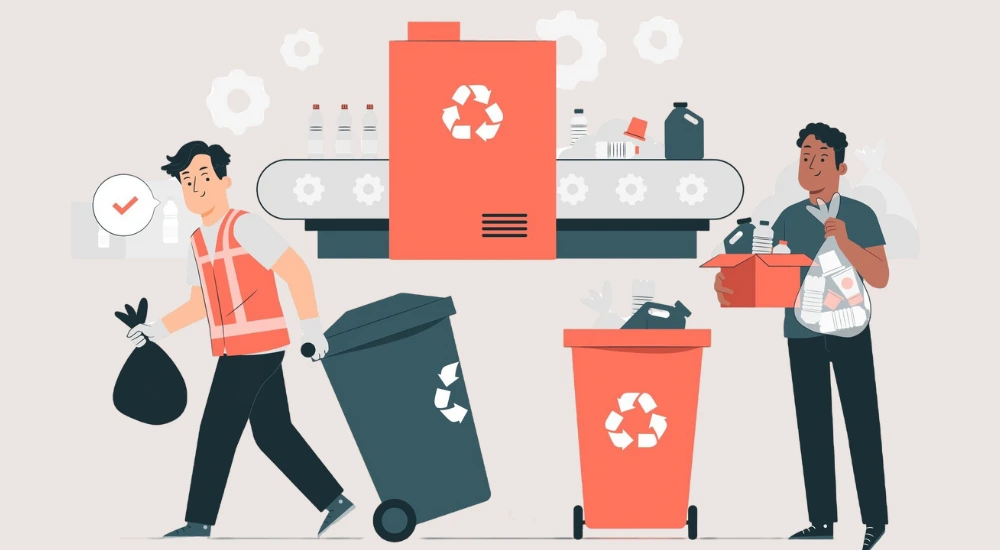Waste management is a critical aspect of environmental sustainability and public health. As our global population continues to grow and consumption patterns evolve, the management of waste becomes increasingly important to reduce environmental pollution, conserve resources, and protect ecosystems. In this comprehensive guide to waste management, we will explore the strategies, benefits, challenges, and environmental impact of effective waste management practices.
Understanding Waste Management
Waste management encompasses the collection, transportation, processing, recycling, and disposal of waste materials. It involves a systematic approach to managing solid waste, liquid waste, and hazardous waste to minimize environmental impact and promote resource recovery. Effective waste management strategies aim to reduce waste generation, maximize recycling and reuse, and ensure proper disposal of residual waste.
Importance of Effective Waste Management
Effective waste management is crucial for several reasons:
- Environmental Protection: Proper waste management helps prevent pollution of land, water, and air. By controlling waste disposal and promoting recycling, we can reduce the environmental impact of waste on ecosystems and natural resources.
- Resource Conservation: Recycling and recovery of materials from waste reduce the need for virgin resources. This conserves natural resources, reduces energy consumption, and lowers greenhouse gas emissions associated with resource extraction and production.
- Public Health and Safety: Inadequate waste management can lead to the spread of diseases, contamination of water sources, and air pollution. Proper waste disposal and treatment help protect public health and ensure a safe living environment.
- Circular Economy: Effective waste management promotes the concept of a circular economy, where resources are reused, recycled, and repurposed to create a sustainable and closed-loop system. This approach minimizes waste generation and maximizes resource efficiency.
Waste Management Strategies
1. Source Reduction
Source reduction, also known as waste prevention or minimization, focuses on reducing waste generation at the source. This strategy involves designing products with minimal packaging, promoting reusable products, and encouraging sustainable consumption practices to minimize waste production.
2. Recycling and Waste Separation
Recycling involves collecting, sorting, and processing waste materials to produce new products or raw materials. Waste separation at the source and recycling facilities helps divert recyclable materials from landfills and incineration, reducing the burden on waste disposal sites and conserving resources.
3. Composting
Composting is the natural decomposition of organic waste into nutrient-rich compost that can be used to enrich soil and support plant growth. Composting organic waste, such as food scraps and yard waste, reduces methane emissions from landfills and promotes soil health and fertility.
4. Waste-to-Energy
Waste-to-energy technologies convert non-recyclable waste into energy, such as electricity or heat. Incineration, gasification, and pyrolysis are common waste-to-energy processes that help reduce the volume of waste, generate renewable energy, and offset fossil fuel consumption.
5. Landfill Management
Landfills are engineered disposal sites for non-recyclable waste materials. Proper landfill management includes site selection, waste compaction, leachate treatment, and landfill gas capture to minimize environmental impacts and protect groundwater quality.
Benefits of Effective Waste Management
- Environmental Protection: Proper waste management reduces pollution, conserves natural resources, and mitigates the impact of waste on ecosystems and biodiversity.
- Resource Conservation: Recycling and recovery of materials from waste reduce the demand for virgin resources, promoting resource efficiency and circular economy principles.
- Energy Recovery: Waste-to-energy technologies convert waste into renewable energy, reducing the reliance on fossil fuels and contributing to sustainable energy production.
- Economic Opportunities: Effective waste management creates new industries and job opportunities in recycling, waste treatment, and renewable energy sectors, contributing to economic growth and innovation.
- Community Health: By managing waste properly, communities can safeguard public health, reduce the spread of diseases, and create a cleaner and safer living environment for residents.
Environmental Impact of Ineffective Waste Management
Ineffective waste management practices have significant environmental consequences, including:
- Air Pollution: Improper waste incineration and open burning release harmful pollutants and greenhouse gases into the atmosphere, contributing to air pollution and climate change.
- Water Contamination: Landfill leachate, the liquid that seeps through waste in landfills, can contaminate groundwater and surface water with toxins, heavy metals, and chemicals, posing risks to aquatic ecosystems and human health.
- Land Degradation: Improper waste disposal leads to land degradation, soil contamination, and habitat destruction, affecting biodiversity, ecosystem services, and agricultural productivity.
- Marine Pollution: Plastic waste and marine debris end up in oceans and waterways, endangering marine life, disrupting ecosystems, and contributing to the global plastic pollution crisis.
- Greenhouse Gas Emissions: Methane, a potent greenhouse gas, is produced during the decomposition of organic waste in landfills, contributing to global warming and climate change.
Challenges in Waste Management
Effective waste management faces several challenges, including:
- Waste Generation: The increasing volume and complexity of waste generated pose challenges for collection, recycling, and disposal infrastructure.
- Resource Constraints: Limited resources, such as funding, technology, and trained personnel, can hinder the implementation of comprehensive waste management programs.
- Behavioral Change: Promoting waste reduction, recycling, and composting requires changing consumer behavior, raising awareness, and incentivizing sustainable practices.
- Regulatory Compliance: Ensuring compliance with waste management regulations, environmental standards, and waste disposal guidelines can be complex, requiring coordination among stakeholders and authorities.
- Technological Advancements: Keeping pace with technological advancements in waste treatment, recycling technologies, and waste-to-energy processes is essential to improve waste management efficiency and sustainability.
Future Trends in Waste Management
The future of waste management is shaped by emerging trends and innovations, including:
- Circular Economy Practices: Transitioning to a circular economy model, where resources are reused, recycled, and repurposed, is a key trend in waste management to promote resource efficiency and reduce waste generation.
- Smart Waste Management: Utilizing technology, data analytics, and IoT solutions for waste collection, sorting, and tracking enables more efficient and sustainable waste management practices.
- Zero Waste Initiatives: Zero waste initiatives aim to minimize waste generation, maximize recycling and composting, and eliminate the need for landfill disposal, contributing to a more sustainable and resource-efficient future.
- Extended Producer Responsibility: Implementing extended producer responsibility (EPR) programs holds manufacturers accountable for the lifecycle of their products, encouraging design for recyclability and waste reduction.
- Collaborative Partnerships: Building partnerships among governments, industries, communities, and NGOs is essential for addressing complex waste management challenges and implementing integrated and sustainable solutions.
Conclusion
Effective waste management is essential for protecting the environment, conserving resources, and promoting sustainable development. By implementing integrated waste management strategies, recycling initiatives, and waste reduction practices, we can minimize the environmental impact of waste and create a more sustainable and circular economy.
As individuals, communities, businesses, and governments work together to address waste management challenges, we can build a cleaner, healthier, and more resilient future for generations to come.













